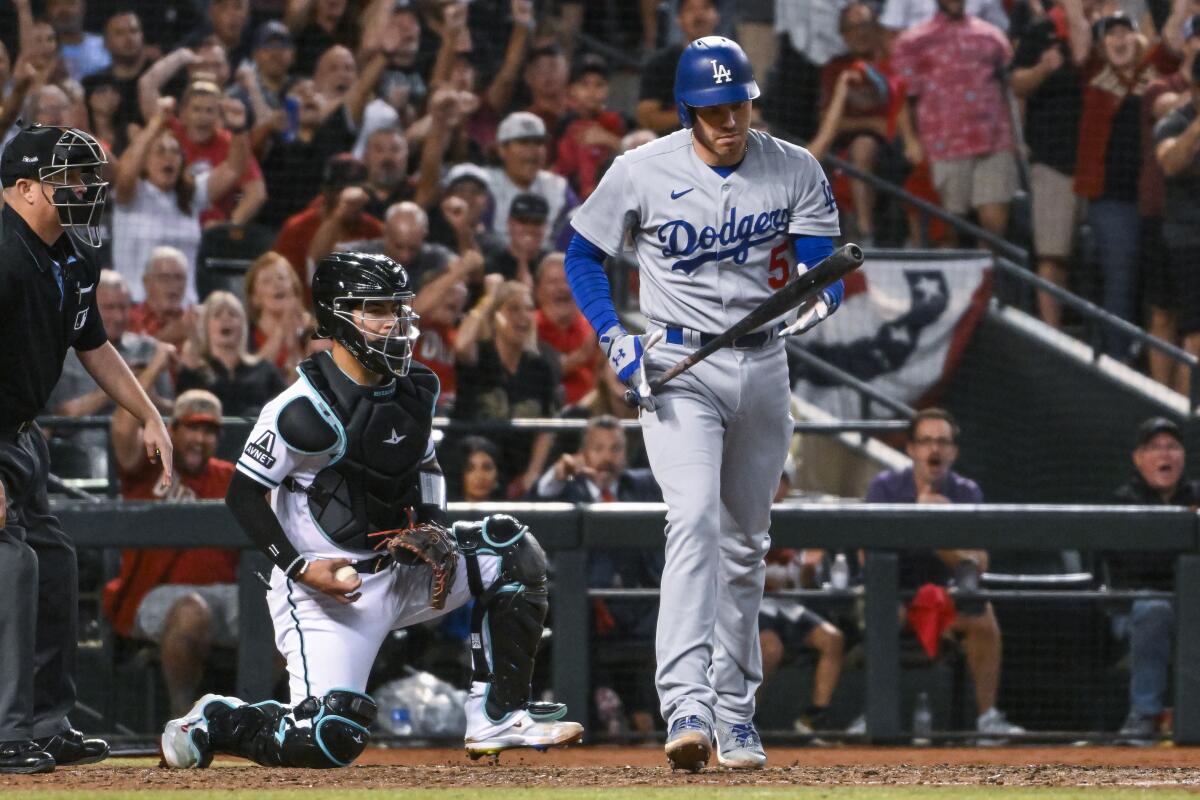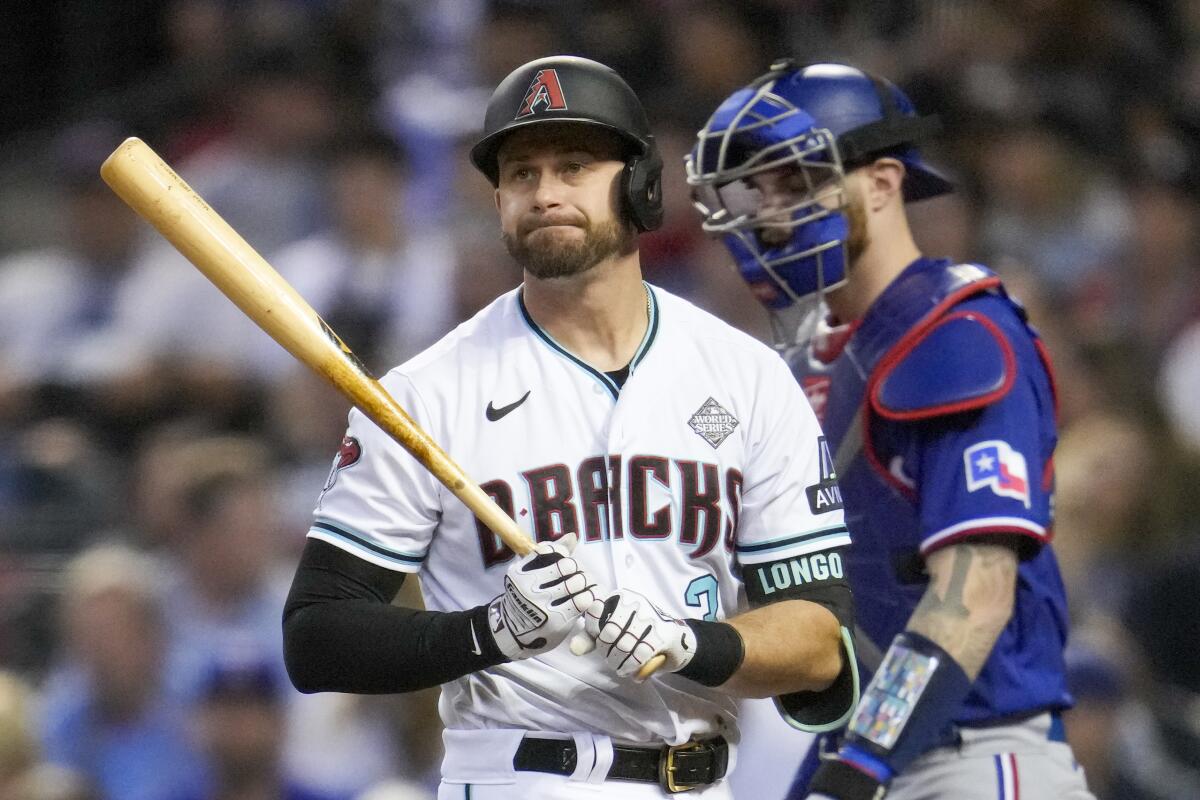News Analysis: Is MLB’s new playoff format too harsh on division winners? The debate continues

- Share via
PHOENIX — The Dodgers aren’t playing in the World Series, but their connections to the teams in it have been impossible to ignore. There’s former Dodgers shortstop Corey Seager again smashing pivotal home runs and former Dodgers starter Max Scherzer again succumbing to an ailment in the postseason and former Dodgers afterthought Josh Sborz for the first time starring as a high-leverage reliever.
A current Dodger even surfaced. Mookie Betts was in attendance and on the field before Monday’s Game 3 at Chase Field acting as a “player correspondent” providing content on Major League Baseball’s platforms. He asked Roberto Clemente Award winner Aaron Judge about his dogs during a news conference. He hung out with a group of former players during batting practice. He chatted with players on both the Arizona Diamondbacks and Texas Rangers.
It was a strange development considering what happened here less than three weeks earlier: The 100-win Dodgers’ season coming to a shocking conclusion against the 84-win Diamondbacks in the National League Division Series. Arizona dominated them. Not once did the Dodgers lead in the three-game sweep. Betts went 0 for 11 with one walk in the series. But there was Betts anyway.
Three years after leading the Dodgers’ World Series win in the Texas bubble, Corey Seager is playing for the title again on the same field with the Rangers.
The Dodgers weren’t the only regular-season behemoth to encounter a stunning early playoff exit. The 101-win Baltimore Orioles were swept out of the American League Division Series by the Rangers. The 104-win Atlanta Braves, owners of the best record in the majors, were bounced in four games by the Philadelphia Phillies in the NLDS.
The unexpected eliminations produced a familiar debate: Has Major League Baseball gone too far in deemphasizing the 162-game regular season? Commissioner Rob Manfred doesn’t think so. To him, having less predictability in the postseason is a feature, not a bug.
“If the die was cast, meaning, ‘If I win 100 in the regular season, I’m going to win the World Series,’ I don’t think that’s as interesting as what we have witnessed over the last month,” Manfred said before Game 1 of the World Series.
The options, however, aren’t as binary as Manfred suggested. MLB has never given a team the championship just for winning 100 games. The original format, though, almost always led to a 100-win club winning the title. Through 1968, a team won the pennant by finishing with the best regular-season record in its league.
Now, after several changes over the decades, the postseason has featured six teams in each league — three wild-card clubs and three division winners — over the last two years. The drumbeat to give the best regular-season teams a better chance to advance deeper into October is getting louder.
“It will at least motivate a conversation about whether we have it right,” Manfred said. “I’m sure that conversation will take place [after the postseason]. Enough has been written and said that we have to think about it and talk about it. But, again, my own view is that the format has served us pretty well.”

The format’s five-day layoff for the two best teams in each league adds another layer of contention. It’s generally accepted that the idle time affects hitters’ timing. But the Houston Astros, who reached the American League Championship Series for the seventh straight season, have figured it out in the format’s short lifespan. The Dodgers, meanwhile, have been bounced in the NLDS both years.
The regular season ended on a Sunday. The Dodgers played their first playoff game the following Saturday. In between — on Wednesday, Thursday and Friday — they simulated live at-bats, even holding an intrasquad game with season ticket holders in attendance at Dodger Stadium.
“I certainly would not use that as an excuse,” Dodgers president of baseball operations Andrew Friedman said of the layoff. “And our goal next year is to win the division and have those five days off again. So it’s two years into this format. We don’t concern ourselves too much with what’s optimal, what’s ideal. It doesn’t really matter. It is what it is.”
The latest playoff expansion was installed with one thing in mind above all else: money. MLB initially wanted 14 — not 12 — playoff teams before compromising during collective bargaining agreement negotiations before the start of last season.
More playoff games means more content for rights holders to pay for. More teams in playoff contention means more fans paying attention through September. That means more fans attending and watching games. It all leads to more money.
But at some point short-term money grabs could hurt the long-term product. The question is whether it’s already happening. Stars sell and the best regular-season teams usually have the biggest stars. Not always. But usually. And the best regular-season teams are often marquee franchises with the biggest fan bases. Not always. But often.
MLB players are excited about the prospect of playing in the 2028 Los Angeles Olympics. So why won’t the league commit to making it happen?
The Rangers and Diamondbacks both qualified for the postseason as wild-card teams. Their combined .545 winning percentage is the lowest ever for a World Series matchup.
Game 1 was the third-least-watched World Series game ever. It was the second-least watched until Game 2 became the least watched. Dallas-Fort Worth is the fifth-biggest market in the majors. Phoenix is the 11th. Market size doesn’t explain the apparent lack of general interest.
Scherzer was a member of the Major League Baseball Players Assn.’s executive subcommittee during CBA negotiations. He was a staunch advocate for the No. 3 seed in each league — a division winner — hosting a two-game series against the No. 6 seed — the last of the three wild-card teams. The wild-card team would need to win both games to advance; the division winner would need to win just one. Currently, the No. 3 seed hosts the No. 6 in a standard best-of-three series.
“If you say, ‘All right, let’s look at 2024, what do you wanna do as the Texas Rangers?’ You want to win your division,” Scherzer said. “That should mean something structurally significant in the playoffs. And the best format for me when I’ve been involved in these discussions is the game-in-hand format strengthens the argument to win the division even more.”
The MLBPA also proposed stretching the division series from a best-of-five to a best-of-seven and reseeding the teams after the wild-card round based on regular-season winning percentage. MLBPA executive director Tony Clark this week said shortening the regular season — to 154 or 158 games — has been discussed in the past, but hurdles exist. Owners would seemingly be against relinquishing the money from guaranteed home games while players would not want their salaries to shrink.
“Over the course of 162 [games], you appreciate that means something, and we want to make sure that teams do what they need to do to compete over the course of the long haul,” Clark said. “And not just the second half of the season.”

Evan Longoria has played on teams on both sides of the debate. In 2021, his 107-win San Francisco Giants, NL West winners, were eliminated in the NLDS by the Dodgers in five games. This year, he’s the oldest player on the Diamondbacks.
The postseason format in 2021 was different — five teams in each league reached the postseason and there was a win-or-go home game between wild-card teams — but the layoff for the leagues’ best teams was the same. So was the lack of a reward for winning the division beyond one more home game. Longoria dismissed the notion that the format is an issue.
“If you were to say in May or June, ‘You’re going to win the division. You’ll have three or four days off at the end of the season,’ teams [would say], ‘Yeah, we’ll take it. Let’s rest up. We get to line our starters up. Maybe get some guys who are injured back off the IL and then we get there.’
“And those teams lose and all of a sudden it’s a point of discussion. There’s probably no right answer because inevitably if you change it something’s going to happen … and then we’ll be talking about the other way around. I just feel like there’s probably no right answer.”
For now, the answer will produce a champion that didn’t win more than 90 games during the regular season. Manfred doesn’t see a problem with that.
More to Read
Go beyond the scoreboard
Get the latest on L.A.'s teams in the daily Sports Report newsletter.
You may occasionally receive promotional content from the Los Angeles Times.













